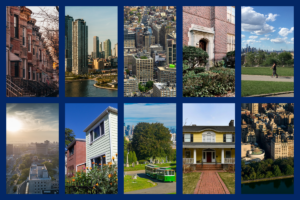H.R. 3700, known as Housing Opportunity through Modernization Act of 2016, is a fun-filled bill that can open up the use of FHA loans for condominiums. This is a good thing for the boroughs that are chock-full of condos — some of which have limited availability to financing.
So, what is this new law and can it affect you positively? The answer is, perhaps!
The Backstory
This bill amends the old style U.S. Housing Act of 1937 and some other dusty laws that pertain to HUD, rental assistance for public housing, the FHA and the USDA (single-family housing guarantee loan program). Needless to say, some of this stuff really needed updating.
H.R. 3700 was introduced to Congress on Oct. 7, 2015 and enacted into law by President Obama on July 29, 2016. If you want to read a government version of the bill, here is a link — it’s only 34 pages!
The FHA Gets a Makeover in the Condo Department
For the purposes of this article, let me zero in on Title III (Section 301), FHA Mortgage Insurance for Condominiums. The changes they made to this section are very good for New York condo buyers (FHA loans are not available to co-op buyers). It will open the doors to the availability of FHA loans for condos in Manhattan and the surrounding boroughs. In turn, more potential buyers that need FHA loans to qualify will be able to use them to purchase condos.
Three Big Changes in This Section
The FHA requires a building to be reviewed and approved in order for the FHA to allow lending in the building. But, just like Fannie and Freddie, the FHA wants to make sure the building is financially sound and stable before they invest in it. Incidentally, you do, too.
- Previously, the FHA required the building to resubmit a new application every time it was up for renewal. Basically starting all over again is a very expensive and cumbersome process. Now the FHA requires the building to renew less often and it basically is an update rather than a re-submission. This makes it easier and less costly for the condo corporation, thus there will be more buildings applying for FHA approval and keeping up to date, widening the pool of buildings that will accept FHA loans from buyers.
- The FHA increased the percentage of usable square feet that may be allocated towards commercial space. The FHA will now lend in buildings that have 25 percent of commercial space. Many building in the boroughs have a mix of commercials and residential space (called condops), with commercial space on the ground level. Allocating 25 percent of the space to commercial is a very generous amount and will open up more buildings to FHA approval.
- The amount of owner-occupied units has been decreased to 35 percent down from the previous 50 percent requirement. This means that only 35 percent of all apartments need to be owner-occupied for the FHA to say they will lend in the building. The rest of the units can be investor-owned, rentals or sponsor-owned. Be aware though that the lender will still have a requirement that no one entity or person own more than 10 percent of the units. So if one investor owns 15 percent of the units, the bank might not allow the mortgage.
All of this a great news and easing lending standards is a good thing for all potential buyers. This does not mean that if you are approved for an FHA loan, you will automatically be approved for the condo. Remember each building has their own requirements, so make sure you meet those before you apply for any mortgage.
Related:









